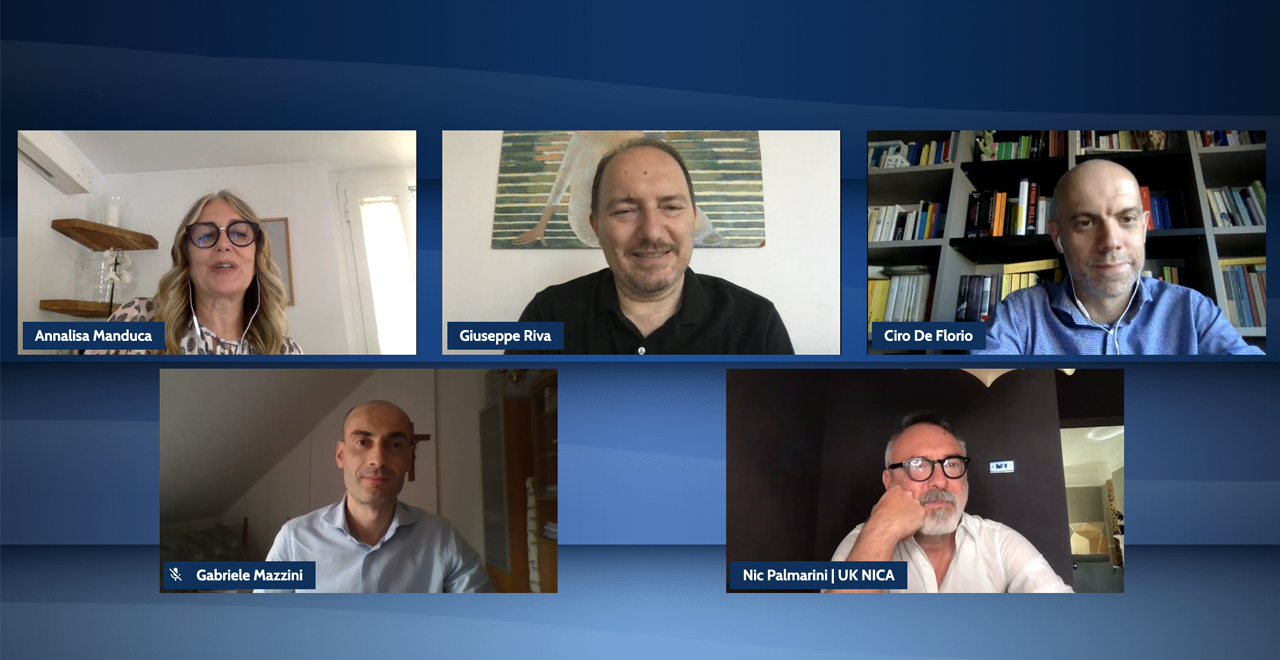Do wise machines exist? What does it mean to live online? Is technology useful for people's well-being? These are just some of the questions that the journalist and Radio Uno Rai presenter Annalisa Manduca asked the protagonists of the webinar "Is there such a thing as digital wisdom", streamed on Thursday 10 June on the Unicatt social networks and during which the newborn laboratory of Università Cattolica Humane Technology Lab was presented. The questions were answered by Giuseppe Riva, professor of General Psychology and director of Humane Technology Lab, Ciro De Florio, professor of Logic and Philosophy of Science at Università Cattolica, Nicola Palmarini, director of the UK's National Innovation Centre for Ageing, and Gabriele Mazzini, European Commission, DG-Connect.
An exciting dialogue for its attempt to investigate a 'supposed' or 'real' digital wisdom. «As a professor and as a parent, I am aware of the impact that technology is having on our lives these days» began Professor Riva, immediately entering the heart of the debate. «Covid has changed the rules of the game and perhaps one of the issues we need to discuss today is whether we can use technology in a balanced way». From this point of view, «the new laboratory aims to bring together the multidisciplinary skills present in our University and to integrate many perspectives». Indeed, if there is a right way to tackle the risks associated with the use of new technologies, it is through a 'choral approach'.
Talking about other disciplines, do technology and philosophy like each other? «They have to like each other because our future depends on it. Rather, philosophy, together with the other humanities, must play on the offensive, dealing with the more structural aspects and becoming an integral part of the development of technology», said Ciro De Florio. The big dilemma, however, is whether machines can be wise. According to Gabriele Mazzini, «what matters is that the use of technology is wise" because "you cannot expect wisdom from machines». Moreover, the European Commission itself, from a regulatory point of view, treats Artificial Intelligence as a 'product' and in light of this factor has proposed a "draft regulation to prevent and minimise a number of consequences that may arise from its use."
It goes without saying that behind the users there are always people who can suffer consequences, even painful ones, if technology takes control and gets their decisions wrong. A theme dear to Nicola Palmarini. «This digital experience that we live generates new pathologies that affect all generations, for example the fear of being cut off». Moreover, if we consider wisdom as 'altruism', 'empathy', then yes, we struggle to talk about digital wisdom. Yet we tend to like decisions made by machines and rely too often on technology even though we know it is wrong. This is why, commented Professor Riva, one of the future challenges ‒ also at the heart of the Humane Technology Lab's work ‒ is to achieve balance, the real key to digital wisdom. A balance that is useful ‒ the speakers unanimously agreed ‒ to look beyond the 'opacity' that lies behind the management of algorithms. «We are dealing with opaque tools because they depend on data that have a certain degree of unpredictability", Mazzini noted, which is why "regulatory interventions are necessary». However, the European Commission's assessment of artificial intelligence is positive. «We are talking about a 'third way' in the approach to new technologies that will allow us to develop them in a sustainable way based, on the one hand, on excellence and, on the other hand, on trust deriving from standards».
While regulation is needed, education is crucial. We need to «educate those who design progress and technologies at least to an awareness of the effects and not just the benefits», Nicola Palmerini pointed out. In short, the light and shade of technology. Of course, Giuseppe Riva warned, «living in the digital world is not the same thing as living in the physical world». But "without throwing the baby out with the bathwater," technology should not be 'demonised' and can be a great opportunity, especially for young people. Hence the need to be aware of the risks, thanks also to "dialogue between various skills and disciplines". This is precisely the aim of Humane Technology Lab.





